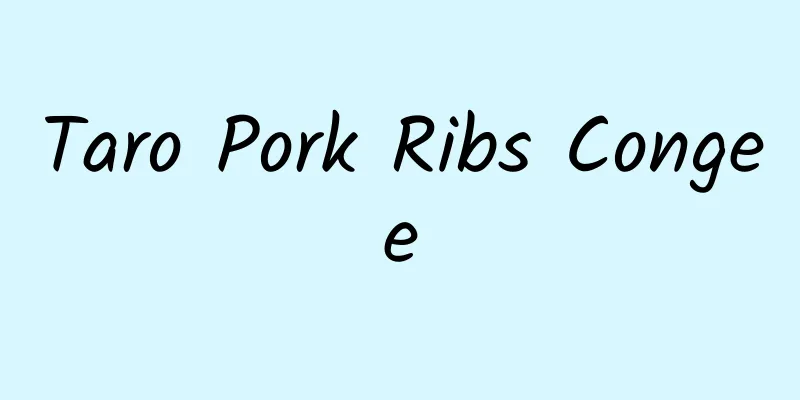Taro Pork Ribs Congee

|
It goes without saying that the 598 taro and pork ribs porridge is more nutritious than the taro and pork ribs porridge. Let me give you a detailed introduction to this porridge. Taro Pork Ribs CongeeMaterial 20g taro, 50g spareribs, 480cc bone broth, 1 bowl of white porridge, 1 tsp fried shallot, some chopped green onion, 1/2 tsp salt, a pinch of pepper How to make taro pork ribs porridge1. Cut the taro into cubes, fry in 160℃ oil for about 2 minutes, then drain. Cut the ribs into cubes, blanch in boiling water, remove, wash, drain and set aside. 2. Take a soup pot, pour in the bone broth first, then add the taro cubes and spareribs from step 1, cook over low heat for about 10 minutes until the aroma comes out, then add in the white porridge and fried shallots and cook until boiling, then add in seasonings and chopped green onions. According to Zhejiang Science and Technology News, taro is rich in nutrients, including 13% carbohydrates, mainly starch, about 2% protein, and very little fat. Taro also contains potassium, calcium, carotene, vitamin C, B vitamins, saponins and other ingredients, among which the fluorine content is relatively high, which has the effect of protecting teeth. Taro contains a natural polysaccharide plant colloid that can increase appetite, aid digestion, and has an antidiarrheal effect. It also has the function of dietary fiber, can moisten the intestines and promote bowel movements, and prevent constipation. It can also enhance the body's disease resistance and help recovery after illness. Taro can be used as a staple food or a vegetable. It is delicious when steamed, stewed, or made into soup. However, since taro contains a lot of starch, it is best to consume 50 to 100 grams at a time. Do not eat it raw, as the mucus in it will irritate the throat. Precautions for making taro and pork ribs porridge1. Taro can be eaten as a staple food, steamed and dipped in sugar, or used to make dishes and snacks, so it is a favorite root food; 2. Taro must be cooked thoroughly, otherwise the mucus in it will irritate the throat; 3. The mucus of taro contains a complex compound that can be decomposed when exposed to heat. This substance has a therapeutic effect on the body, but it is highly irritating to the skin and mucous membranes. Therefore, when peeling taro, the skin of the hands will become itchy. Roasting them over the fire can relieve the itch, so it is best to wear gloves when peeling taro. |
<<: Salty Pork Ribs and Dried Vegetables Porridge
Recommend
The efficacy, effects and taboos of white plum blossom
The white plum blossom has a pure white color and...
Nutritional value of Flammulina velutipes
Today I will tell you about the nutritional value...
How to make delicious sweet chestnut pumpkin
Sweet chestnut pumpkin is a top-quality pumpkin. ...
Benefits of Pumpkin Porridge
Are you familiar with the benefits of pumpkin por...
Steps for cooking fried duck breast with eggplant
Fried eggplant with cured duck breast is deliciou...
Summer management technology of eggplant. Precautions for growing eggplant in summer
What issues do we need to pay attention to when g...
How to make dragon beard vegetable delicious
When people see the name of Asparagus, most of th...
How is Linköping University in Sweden? Linköping University in Sweden reviews and website information
What is the website of Linköping University in Swe...
How is Evraz Group? Evraz Group reviews and website information
What is the website of Evraz Group? Evraz Group is...
How is the Australian TPG network? Australian TPG network review and website information
What is the Australian TPG Network? TPG Network (T...
How is Meiji Yasuda Life Insurance Company? Meiji Yasuda Life Insurance Company reviews and website information
What is the website of Meiji Yasuda Life Insurance...
What is the German Foreign Ministry like? German Foreign Ministry reviews and website information
What is the website of the German Foreign Ministry...
How is Shinhan Bank in South Korea? Reviews and website information of Shinhan Bank in South Korea
What is the website of Shinhan Bank? Shinhan Bank ...
What are the harms of alcoholism? What are the harms of alcoholism?
Many men in life like to drink. Drinking in moder...
How is Shigeru Ban's architecture? Reviews and website information of Shigeru Ban's architecture
What is Shigeru Ban Architects? Shigeru Ban Archit...









